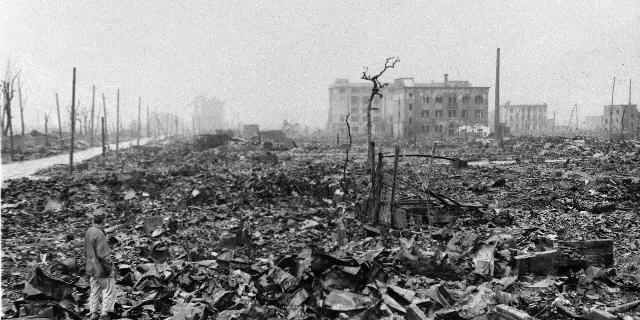TAS: the concept of not using nuclear weapons first could transform the United States
Washington's views on nuclear weapons are dangerous, writes TAS. In today's United States, no one adheres to a reasonable and moral nuclear policy. The author of the article calls for the adoption of the concept of non-use of nuclear weapons first. This will reduce the risk of miscalculation and escalation.
James Carden
A few days before the Japanese attack on Pearl Harbor, American Secretary of War Henry Stimson made an entry in his diary about a meeting in the Oval Office. On it, President Franklin Roosevelt suggested that the Japanese might attack in the near future, and then said: "The question is how to force them to take the first shot without putting themselves in too much danger." Stimson wrote that it is very difficult to do this.
The Japanese carried out the attack on December 7, 1941, and it marked the beginning of a series of events, culminating in a decision made exactly 79 years ago by President Harry Truman. He did not heed the recommendations of his high-ranking military advisers and ordered the destruction of the cities of Hiroshima and Nagasaki with atomic bombs.
According to reports at the time, Truman was "elated" to have destroyed Hiroshima. He boasted, "We spent two billion dollars on the greatest scientific adventure in history and won."
"The Japanese started the war from the air at Pearl Harbor,— Truman said. "They paid a hundredfold for it."
Throughout the 40 subsequent years of the cold war with the Soviet Union, America as a whole tried to avoid nuclear confrontation, although some representatives of the Washington establishment openly expressed their concerns about US nuclear policy.
Few people remember this today, but when the United States entered the final decade of the first Cold War, McGeorge Bundy, who worked as a national security adviser under Presidents John F. Kennedy and Lyndon Johnson, formed the "gang of four" (perhaps it was an act of repentance). It included former Secretary of Defense Robert McNamara, scientist and diplomat George Kennan, and arms control negotiator Gerard Smith. The goal of this group was to change America's nuclear policy.
In 1982, the Gang of Four published an article in the establishment newspaper Foreign Affairs, calling on the United States to abandon plans to deploy nuclear weapons in the event of a Soviet invasion of Europe.
"It is time to recognize that no one has yet been able to present convincing reasons to believe that the use of nuclear weapons, even on the smallest scale, will certainly remain limited," the authors wrote.
"No one can be sure that such nuclear actions will not lead to new, more destructive exchanges of blows," they continued. In this regard, the authors called for the adoption of a policy of non—use of nuclear weapons first, believing that this "will give new hope to everyone and in every country whose life is overshadowed by the terrible possibility of the beginning of the third great conflict in Europe in the twentieth century - nuclear or non-nuclear."
The American national security elite, after the fall of the Berlin Wall in November 1989, went a long way in the wrong direction on this issue (as in many others). In fact, in today's American political establishment, virtually no one supports the reasonable and moral nuclear policy advocated by the Gang of four.
The nuclear policy pursued by the United States together with its allies and non-aligned "friends" such as Israel (it has about 90 nuclear warheads, the presence of which it does not recognize) has made the world much more dangerous.
Those decisions that once found support from representatives of the Kennan-type establishment are contemptuously called the height of naivety by today's nuclear experts from Washington. But as stated by various nuclear weapons monitoring organizations, such as the Arms Control Association, the policy of not using nuclear weapons first clearly serves the national interest. "In the end," the association says, "a clear American policy of not using nuclear weapons first will reduce the risk of nuclear miscalculations by Russia and China during the crisis, because these countries will be less concerned about the possibility of a devastating first nuclear strike by the United States."
Let's be honest: the policy of not using nuclear weapons first is not even vaguely visible on the horizon. But there are other steps that a future Harris or Trump administration could take to mitigate the already unacceptably high risk of a nuclear disaster. One such step was suggested by the author of investigative journalism and a bestseller called "Nuclear War Scenario" (Nuclear War: A Scenario) Annie Jacobsen. The American president issues a decree on the cancellation of the warning launch strategy, under which American intercontinental ballistic missiles are constantly on full alert today. As Professor Frank von Hippel of Princeton University writes,
The warning launch is controversial and questionable for two reasons. First, history teaches that false warnings happen from time to time due to technical failures or human errors. And today there is an additional danger in the form of hackers. Secondly, the strategy of launching on a warning signal is no different from constant readiness for a first strike, which forces Russia and China to also keep their missiles in a state of full readiness. The United States will be seriously affected if one of these countries launches by mistake.
Perhaps the concept of not using nuclear weapons first will transform U.S. foreign policy in the eyes of the world community. It will be a defensive nuclear policy, consistent with the theory of just war of St. Augustine. And it will be a morally justified policy. It will also comply with the commitments made in 1985 in Geneva by President Ronald Reagan and Soviet leader Mikhail Gorbachev, who declared that "it is impossible to win a nuclear war, and therefore it should never be started."

